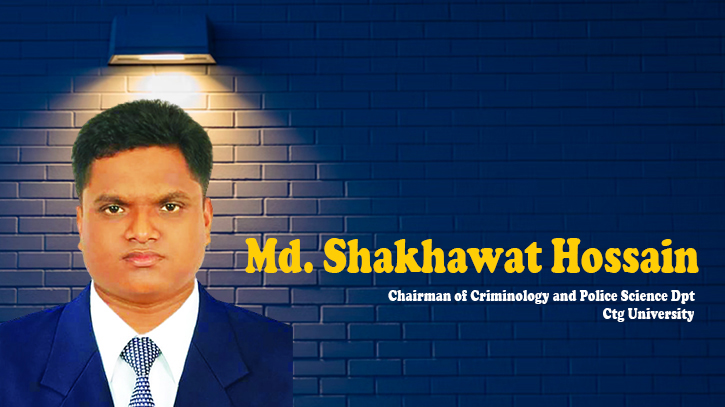
Photo : Messenger
The Cyber Tribunal Court in Bangladesh delivered a verdict on September 14, 2023, that marked the end of a decade-long controversy stemming from the events of May 5, 2013. The court's judgement found Adilur Rahman and Nasir Uddin Elan, associated with the non-governmental organisation 'Odhikar,' guilty of fabricating information and spreading false claims about casualties during the Hefazat-e-Islam protests. The verdict not only signifies a significant legal milestone but also clears Bangladesh of a false stigma that had lingered for years.
May 5, 2013, is a date etched into the collective memory of Bangladesh for the ominous programme orchestrated by Hefazat-e-Islam in Shaplachottor, Motijhel. Under the pretext of demanding punishment for the leaders and activists of Gonojagoron Mancha who advocated for the trials of Bangladesh's war criminals, Hefazat-e-Islam mobilised thousands of innocent students from Quami madrassas to participate in a demonstration.
During the programme, this religious-political organisation made "mediaeval" demands that violated Bangladesh's constitution and threatened to destroy the "secular" government. Hefazat-e-Islam seized Dhaka's entry points and destroyed government assets such as the GPO, Baitul Mukarram Market, and the Office of Traffic Police on that tragic day, causing destruction and violence. BNP-Jamaat leaders and activists, encouraged by opposition leader Khaleda Zia, contributed to the turmoil.
Hefazat-e- Islam ignored the nonviolent calls from the law-enforcing agencies, forcing the government to launch an operation to maintain law and order. Sound grenades and tear gas dispersed Hefazat activists. In response, activists fled Shapla without resistance. Despite the government's efforts to limit losses, eleven people died that day, most of them during the day-long conflict.
Hefazat Islam stated that law enforcement killed 2,500 leaders and activists after the unsuccessful Shapla Chattar occupation. Hundreds of bodies were reportedly removed on trucks at night. Media outlets falsely portrayed victims of unconnected incidents in different nations as law enforcement victims to lend credibility to their charges. This operation was led by BNP leaders, activists, and Jamaat members to defame law enforcement and the government globally. Misinformation campaigns in Bangladesh also aimed to foment communal strife, worsening the problem. Adilur Rahman entered the scene after the custody death campaign stalled due to a lack of proof.
Adilur Rahman, a former BNP-led four-party coalition government Deputy Attorney General, led 'Odhikar,' a non-governmental organisation that published many missing homicide cases. In its Fact Findings Report, "Assembly of Hefazate Islam Bangladesh and Human Rights Violation," Odhikar alleged 2,500 people were missing on June 10, 2013. The state's image was seriously tarnished by Al Jaseera, CNN, and the BBC's coverage of this report.
Legal proceedings were lengthy, with Adilur Rahman and Nasiruddin Elan benefiting and their lawyers using various methods to prolong the trial. The Cyber Tribunal Court ruled on September 14, 2023, after a decade-long legal struggle. The summary judgement judge declared the prosecution's case proven beyond a reasonable doubt. Under the ICT Act, the maximum penalty for the offence is ten years in prison and one crore taka. Despite the serious charges and substantial evidence against them, the judge sentenced Adilur Rahman and Nasiruddin Elan to two years in prison and a ten thousand taka fine. Some may consider this lenient sentence "venial" given the offence's seriousness.
Throughout history, the United States of America (USA) has often engaged in heinous attempts to change the regime in its favour, especially during the Cold War. The US either backed the opposition or motivated the military to stage a coup to oust the existing government perceived as ‘unfriendly towards the US’. The US has a wide range of tools to do so. It often succeeds and often fails. And often, the sudden change increases domestic political friction and economic crises. From the Mossadegh regime in Iran to the latest attempt to overthrow Al Assad in Syria, such heinous US attempts mostly had devastating effects for the respective countries. Research on the US attempt to install a puppet regime also concludes in this way.
The US was also behind the latest parliamentary ousting of Imran Khan in Pakistan. According to the Intercept’s report based on leaked cables, the US pressurised the parliament of Pakistan to oust Khan. Imran Khan, the World Cup-winning captain turned politician, also claimed before his removal that US diplomats were behind his thwarting. After the ousting, Pakistan became divided over the political situation, and a crackdown on Khan’s party was taking place. The current regime also puts Mr. Khan in jail.
To conclude, history suggests that the major US interventions in foreign countries' administrations had long-term adverse impacts on the state and society, and the US hardly takes responsibility on its shoulders in the aftermath. Lindsey O’Rourke’s research on the US attempt to change the regime also pointed out the adverse impacts of the US attempt. O’Rourke is an assistant professor of political science at Boston College. According to O’Rourke’s research, “After a nation’s government was toppled, it was less democratic and more likely to suffer civil war, domestic instability, and mass killing. At the very least, citizens lost faith in their governments."
The US also tries to enforce illegal influence on the occasion of the upcoming parliamentary election in Bangladesh. But the US encouraged Bangladeshi authorities to thoroughly investigate the incidents surrounding the October 28 BNP rally and hold those responsible for the violence accountable. "We condemn the political violence that took place in Dhaka on October 28. The reported killing of a police officer, a political activist, and the burning of a hospital and buses are unacceptable, as is violence against civilians, including journalists," said Matthew Miller, spokesperson of the US State Department, at a briefing in Washington last night.
The writer is Assistant Professor and Chairman of Criminology and Police Science Department in Chittagong University
Messenger/Disha








